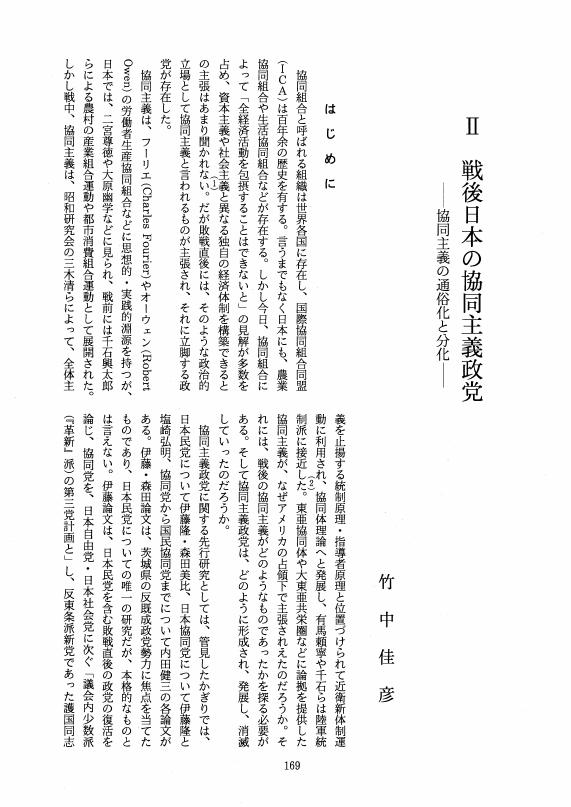50 0 0 0 OA 保革イデオロギーの影響力低下と年齢
- 著者
- 竹中 佳彦
- 出版者
- 日本選挙学会
- 雑誌
- 選挙研究 (ISSN:09123512)
- 巻号頁・発行日
- vol.30, no.2, pp.5-18, 2014 (Released:2018-02-02)
- 参考文献数
- 23
- 被引用文献数
- 2
若年層の政党の保革イデオロギーへの位置づけは高齢層と異なるという知見を踏まえ,(ア)イデオロギーの自己位置づけ(イ)争点態度の一貫性,(ウ)支持政党・投票政党とイデオロギーとの相関の年齢による違いを,JIGS有権者調査(2013年),JESⅣ調査(2010年)とJES調査(1983年)を用いて比較分析した。その結果,①同一コーホートが保守化してはいないが,若年層は,保革イデオロギーを認識しておらず,認識していた場合には自己を革新的と位置づけ,②若年層にも,争点の態度空間に一貫した基底的構造はあるが,その力は弱く,また保革イデオロギー次元でない場合もあり,③40歳代以下に,支持政党・投票政党と保革イデオロギーとの相関がない場合があった。このようにイデオロギーの自己位置づけと争点態度と投票政党との間の一貫性の喪失が,若年層ほど進んでいることを示した。
6 0 0 0 OA 戦後日本の協同主義政党-協同主義の通俗化と分化-
- 著者
- 竹中 佳彦
- 出版者
- JAPANESE POLITICAL SCIENCE ASSOCIATION
- 雑誌
- 年報政治学 (ISSN:05494192)
- 巻号頁・発行日
- vol.49, pp.169-194, 1999-01-27 (Released:2009-12-21)
4 0 0 0 OA エリートのイデオロギーと平等観
- 著者
- 竹中 佳彦 遠藤 晶久
- 出版者
- 日本政治学会
- 雑誌
- 年報政治学 (ISSN:05494192)
- 巻号頁・発行日
- vol.71, no.1, pp.1_13-1_33, 2020 (Released:2021-06-16)
- 参考文献数
- 13
グローバル化と 「格差社会」 の進展、統治機構改革などは、エリートの平等観や政策選好をどのように変化させたであろうか。本論文は、1980年の 「エリートの平等観」 調査 (三宅一郎・綿貫譲治・嶋澄・蒲島郁夫. 1985. 『平等をめぐるエリートと対抗エリート』) に倣って2018年に実施した調査の結果をもとに、エリートの平等観や政策選好がどのように変化したかを明らかにしようとするものである。なお、この調査でのエリートとは、国会議員だけでなく、地方議員や経営者、労働組合、メディアなど各種リーダーを含めたものである。 本論文では、エリート・レベルのイデオロギー対立とその平等観との連関について、1980年代との比較から検討する。イデオロギーの変容が指摘され、右傾化が論じられている今日において、エリートにおいてもイデオロギー対立の様態が変容しているのかは重要な研究課題といえる。さらに、この約40年の間に生じた 「一億総中流社会」 から 「格差社会」 へという社会変化によって、平等観がイデオロギー対立にどの程度、組み込まれてきているのかについても分析を行う。
4 0 0 0 OA 国際法学者の“戦後構想”-「大東亜国際法」から“国連信仰”へ-
- 著者
- 竹中 佳彦
- 出版者
- JAPAN ASSOCIATION OF INTERNATIONAL RELATIONS
- 雑誌
- 国際政治 (ISSN:04542215)
- 巻号頁・発行日
- vol.1995, no.109, pp.70-83,L9, 1995-05-20 (Released:2010-09-01)
- 参考文献数
- 52
- 被引用文献数
- 1
When did the Japanese begin to regard the United Nations as the ideal organization? Most of Japanese intellectuals must have advocated the construction of the “Greater East Asia Mutual Prosperity Sphere.” When and why did the switch from the regionalism to internationalism occur? This article's purpose is to answer these questions, focusing on the Japanese intellectuals' perception of the postwar international organization in the Pacific War.In 1942, the Association of International Law in Japan established four committees in order to serve their country by pursuing and constructing the Greater East Asian International Law. It made a plan to issue the Greater East Asian International Law Series.The first volume of this series was written by YASUI Kaoru, who was an associate professor of international law at Tokyo University. He introduced the idea of the national socialist international law initiated by Carl Schmitt to Japan. He expressly wrote in this book that he could select neither liberal international law, nor Marxist international law, nor national socialist international law as his own position. But he was purged from Tokyo University in 1948. Why? Because he never denied establishing the Greater East Asian International Law. After the Pacific War he became a Marxist student of international law, and he played an active part in the movement to prohibit the atomic and hydrogen bombs.One of the faculty members to oppose Yasui's promotion to a professor in 1943 was YOKOTA Kisaburo, who was the head professor of international law at Tokyo University. Both Yokota and Yasui were followers of TACHI Sakutaro, but Yokota considered that Yasui was unprincipled and went with the current of the times. Yokota studied the non-belligerency phenomena in World War II, dissimilar to belligerency or neutrality on the international law. He never converted from liberalism to militarism, though he criticized the United Nations for attacking Japanese hospital ships and merchant ships. And he paid attention to the international organization plan discussed among the United Nations at the Dumberton Oaks Conference before the surrender.He foresaw that the United Nations would be the name of the new international organization, and he temporarily translated the word of the United Nations with “Kokusai Rengo, ” which meant not Allied Powers but the international union of states, as if it were an ideal organization. This free translation might only be in imitation of the precedent that the League of Nations had been translated into the term “Kokusai Renmei” which implicated the international league in Japanese, but it was fixed as the formal translation in postwar Japan. It has given the United Nations the image of the ideal international organization for the Japanese.
2 0 0 0 IR 現代日本人のイデオロギー再考--対立・拘束力・規定力
- 著者
- 竹中 佳彦
- 出版者
- 筑波大学人文社会科学研究科現代文化・公共政策専攻
- 雑誌
- 論叢 (ISSN:13499513)
- 巻号頁・発行日
- no.7, pp.25-63, 2008-03
近年、経済的・社会的不平等の拡大への政治的対応が求められている。しかし、政治への参加や政策による応答に格差があるとしたら、かえって不平等を助長するおそれがある。そこで本研究では、政治参加と政策応答という2つの点から政治的不平等の実態を捉え、さらに経済的・社会的不平等と関連付けながら政治的不平等の生成メカニズムを解明する。具体的には、1)大規模質問紙調査に基づく個人と団体の政治参加における不平等の把握、2)個人や団体の政策選好と実際の政策との照合による政策応答における不平等の把握、3)事例研究に基づく具体的な政策争点における参加と応答をつなぐプロセスの把握、という3つの調査研究に取り組む。
1 0 0 0 国会議員の政策争点態度とイデオロギー
- 著者
- 竹中 佳彦
- 出版者
- 日本公共政策学会
- 雑誌
- 公共政策研究 (ISSN:21865868)
- 巻号頁・発行日
- vol.9, pp.35-47, 2010
<p>本稿の目的は,東大・朝日政治家調査と東大・朝日世論調査を用いて,2000年代の日本の国会議員のイデオロギーと信念体系を,有権者と比較しながら,明らかにすることである。分析の結果,以下の結論が得られた。第1に,代議士のイデオロギーには,03年から05年にかけて保守化や脱保守化という傾向は見られない。第2に,自民党代議士のイデオロギーは中道化しており,自民党と民主党のイデオロギー対立はかなり縮まってきている。第3に,国会議員の政党間の政策対立は,自民党と共産党や社民党の間では大きいが,自民党と民主党の間では,有意な差は存在するものの,さほど大きくはない。第4に,国会議員の信念体系は,安全保障に関する争点や小さな政府を強く統合する保革イデオロギーと,日本型システムに関する次元の2次元から構成されている。これに対して有権者の信念体系は,安全保障に関する争点と小さな政府が独立した次元となっており,日本型システムに関する次元とあわせて3次元て構成されている。第5に,国会議員の信念体系も,有権者のそれも,07年になっても大きな変化を見せていないので,イデオロギーを中核とする態度構造は残存している。</p>
- 著者
- 竹中 佳彦
- 出版者
- 筑波大学
- 雑誌
- 筑波法政 (ISSN:03886220)
- 巻号頁・発行日
- vol.12, pp.209-246, 1989
